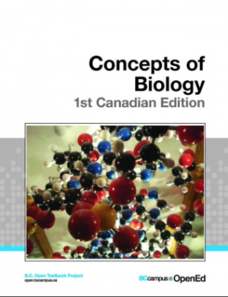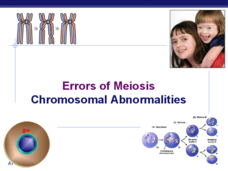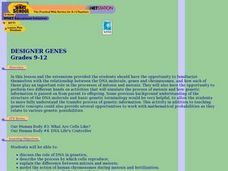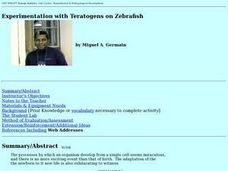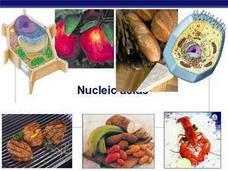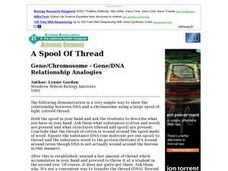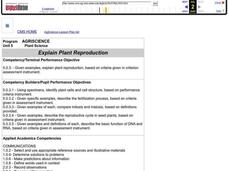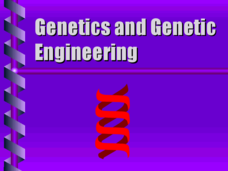Curated OER
Sets of Chromosomes
In this chromosome activity, learners answer eighteen questions about chromatids, chromosomes, types of reproduction, haploid and diploid cells and zygotes.
Curated OER
Sociobiology: Heredity Factors
Students examine DNA replication and how proteins are synthesized from DNA codes and continue to explore the effects of genetics in additional lessons. Among the topics covered are: protein synthesis, cell chemistry, environmental...
BC Open Textbooks
Concepts of Biology – 1st Canadian Edition
How diverse are living things? Individuals explore topics such as cells as the foundation for life, cell division and genetics, molecular biology, and animal reproduction using an open resource Biology textbook. They learn key terms...
Curated OER
Mitosis and Meiosis
Students model and differentiate between the processes of mitosis and meiosis. In partners, they use yarn and construction paper to create models for each of the phases of mitosis and meiosis then compare the chromosome numbers in each...
Rice University
Biology for AP® Courses
An eight-unit electronic textbook provides a guide to AP® Biology. Each of the 28 chapters include an introduction, multiple lessons, a summary, review questions, and test prep questions. Teachers see how each lesson connects to a big...
Curated OER
Errors of Meiosis: Chromosomal Abnormalities
After viewing these concise summaries of the common chromosome abnormalities that cause disorders, students' understanding of genetic errors will be much better. This presentation has clear diagrams to accompany the explanations. The...
Curated OER
Designer Genes
Students view a video on DNA. They discuss mitosis, meiosis and fertilization. They use strips of paper to simulate fertilization and analyze the genotype and phenotype of the combined chromosomes.
Curated OER
Experimentation with Teratogens on Zebrafish
Students compare mitosis and meiosis with regard to chromosome number in parent cells versus daughter cells, types of cells produced, total number of cells produced, and the number of divisions. In groups, identify and differentiate the...
Curated OER
AP Biology Lab Review
A seventy-two slide PowerPoint that reviews several lab explorations done in an AP Biology course. For each lab there is a description, concepts, and conclusions. Many pictures and graphics make this visually appealing, but it would not...
Curated OER
Nucleic Acids: information storage
This sequence of slides covers each main macromolecule that is involved with human structure and function. The history of nucleotide research and the way that they are formed is summarized, a diagram accompanies the explanation. The main...
Curated OER
genetics
Parts of the cell as well as genetic material begin this presentation. As the slides continue, there are explanations of the main terms used in genetics. The structure of genetic material, chromosomes, and replication are summarized....
Curated OER
Homologous Shoes
Students examine the concept of homology by observing their shoes and those of their classmates. They summarize the observations of everyone's shoes relating it to chromosomes in cells. They share their observations with the class.
Curated OER
Life Cycles of Mosses, Ferns, and Conifers
In this plant life cycle worksheet, students compare the life cycles of mosses, ferns, and conifers. This worksheet has 15 fill in the blank and 10 short answer questions.
Curated OER
Genetic Vocabulary Review
In this genetics vocabulary activity, students answer 13 multiple choice questions about the structure and function of genes.
Curated OER
A Spool Of Thread
Pupils describe a spool of light colored thread that the teacher holds in his/her hands. They are asked what substances (cotton and wood) are present and what structures (thread and spool) are present. The teacher conclude that the...
Curated OER
Plant Reproduction
Young scholars plant seeds in order to investigate and explore the questions: "How do seed companies develop varieties of plants?" and "What is the ideal plant?" Students will study related vocabulary and sketch seeds as they emerge....
Curated OER
Genetics and Genetic Engineering
Pretty purple slides present a plethora of jargon related to genetic engineering. Most of them have one term across the top and a brief explanation of that term below. They are arranged in alphabetical order, which may not be the most...
Curated OER
Genetics and Genetic engineering
The details and definitions of Biotechnology and genetic engineering are very useful, but this is a very long PowerPoint with no images or ways of breaking up the information. The slides are nicely composed and relevant, so this could be...
Curated OER
Physiology of Reproduction
In this health worksheet, students examine the human body and make mental connections to the target function highlighted in the sheet.
Biology Junction
Plant Diversity
Ginkgo trees existed for more than 350 million years, and, at this time, only one species still remains. While plant diversity generally increases over geologic time, some interesting exceptions occur. Young scientists learn about plant...
Serendip
Soap Opera Genetics – Genetics to Resolve Family Arguments
Did she cheat on her husband? Did the hospital switch the babies? Should they have children? As much as this sounds like the plot for a soap opera, all of these questions fit into a single lesson on genetics. Scholars read about three...
Curated OER
How To Make an Artificial Organ
Students examine the advances made in technology with regard to prosthetics and replacement organs and limbs. They describe the anatomy and functions of different organs and create their own artificial organ. They defend and present...
Curated OER
Inheritance Patterns in Zorks
In this inheritance patterns worksheet, students create a visual of a Zork using chromosome strips to represent alleles from the father and the mother to determine the traits in the offspring. Students translate the genotype to the...
Curated OER
Reproduction
In this reproduction worksheet, students review the processes involved with sexual reproduction in animals and pollination in plants. This worksheet has 6 fill in the blank, 5 true or false, and 9 short answer questions.




